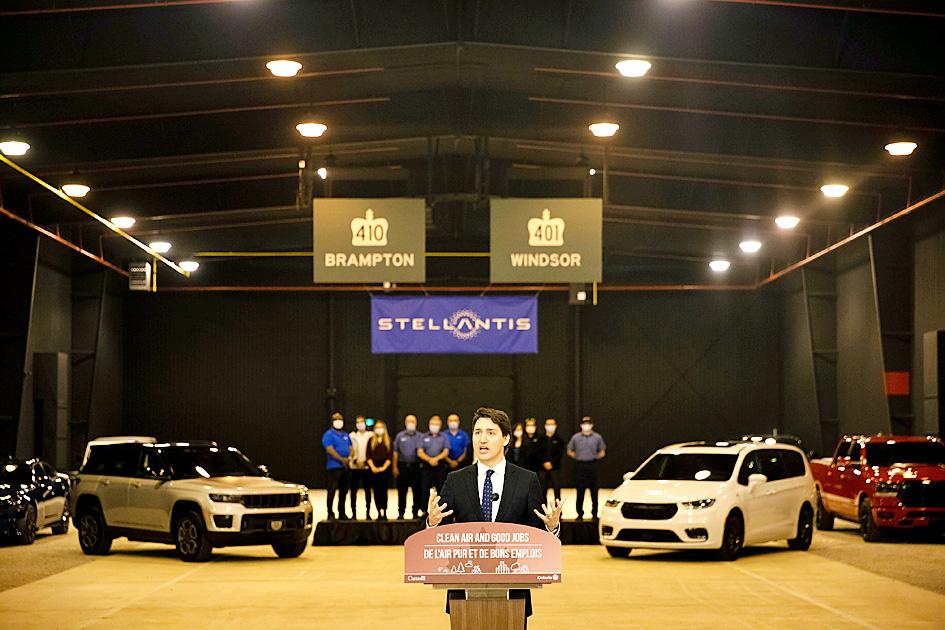Stellantis NV is to invest C$3.6 billion (US$2.8 billion) to retool two Canadian assembly plants to build electric vehicles (EVs), more than doubling an earlier commitment made during union negotiations.
Stellantis, formed from the merger of Fiat Chrysler Automobiles NV and PSA Group last year, is to add a new vehicle platform that can be used to make electric vehicles at its plants in Windsor and Brampton, Ontario, the company said in a statement on Monday.
The investments will restore employment at the two plants, which have suffered reductions in recent years.

Photo: Bloomberg
“These investments reaffirm our long-term commitment to Canada and represent an important step as we move toward zero-emission vehicles,” Stellantis North America chief operating officer Mark Stewart said in the statement.
Canadian Prime Minister Justin Trudeau, Ontario Premier Doug Ford and other Canadian officials attended an event in Windsor on Monday announcing the investment. Ford is expected to officially begin his campaign for re-election this week, with Canada’s most populous province going to the polls next month.
The federal government and the province of Ontario are to spend up to about C$1 billion to support the project.
The sprawling manufacturer of nameplates like Jeep, Ram and Fiat is investing US$35 billion globally through 2025 to beef up its electrification and software capabilities.
In March, Stellantis and LG Energy Solution said they would pour more than US$4.1 billion into a joint venture to build a new EV battery plant in Windsor. The 45 gigawatt-hour factory, which is expected to begin operations in 2025, are expected to create 2,500 jobs, and supply Stellantis’s assembly facility in Windsor and others across North America.
Windsor, which makes the Chrysler Pacifica minivan, is running on two shifts after cutting one-third in 2020. Its second shift is scheduled to be dropped at the end of this year.
The Brampton plant, which makes the Dodge Charger and Challenger muscle cars, would build at least one new all-electric model as part of the investment, the company said.
Both plants are expected to return to three shifts at a later date, the company said.
Meanwhile, Stellantis is to acquire the Share Now vehicle-sharing joint venture formed by BMW AG and Mercedes-Benz AG, a move aimed at tapping new revenue streams.
The company yesterday said its Free2Move mobility service brand would acquire Share Now, without naming a price.
Share Now, the European market leader, allows customers to use smartphones for short-term rentals of vehicles, including Minis or Mercedes-Benz A-Class vehicles in cities.
Free2Move offers app-based parking, leasing and rental services to its approximately 2 million customers.
Share Now provides so-called free-floating vehicle sharing services in 16 European cities and has about 3.4 million customers.
Over the next decade, Stellantis intends to expand Free2move’s presence worldwide, growing it to 15 million active users and achieving net revenues of 2.8 billion euros (US$2.94 billion).

MULTIFACETED: A task force has analyzed possible scenarios and created responses to assist domestic industries in dealing with US tariffs, the economics minister said The Executive Yuan is tomorrow to announce countermeasures to US President Donald Trump’s planned reciprocal tariffs, although the details of the plan would not be made public until Monday next week, Minister of Economic Affairs J.W. Kuo (郭智輝) said yesterday. The Cabinet established an economic and trade task force in November last year to deal with US trade and tariff related issues, Kuo told reporters outside the legislature in Taipei. The task force has been analyzing and evaluating all kinds of scenarios to identify suitable responses and determine how best to assist domestic industries in managing the effects of Trump’s tariffs, he

TIGHT-LIPPED: UMC said it had no merger plans at the moment, after Nikkei Asia reported that the firm and GlobalFoundries were considering restarting merger talks United Microelectronics Corp (UMC, 聯電), the world’s No. 4 contract chipmaker, yesterday launched a new US$5 billion 12-inch chip factory in Singapore as part of its latest effort to diversify its manufacturing footprint amid growing geopolitical risks. The new factory, adjacent to UMC’s existing Singapore fab in the Pasir Res Wafer Fab Park, is scheduled to enter volume production next year, utilizing mature 22-nanometer and 28-nanometer process technologies, UMC said in a statement. The company plans to invest US$5 billion during the first phase of the new fab, which would have an installed capacity of 30,000 12-inch wafers per month, it said. The

Taiwan’s official purchasing managers’ index (PMI) last month rose 0.2 percentage points to 54.2, in a second consecutive month of expansion, thanks to front-loading demand intended to avoid potential US tariff hikes, the Chung-Hua Institution for Economic Research (CIER, 中華經濟研究院) said yesterday. While short-term demand appeared robust, uncertainties rose due to US President Donald Trump’s unpredictable trade policy, CIER president Lien Hsien-ming (連賢明) told a news conference in Taipei. Taiwan’s economy this year would be characterized by high-level fluctuations and the volatility would be wilder than most expect, Lien said Demand for electronics, particularly semiconductors, continues to benefit from US technology giants’ effort

‘SWASTICAR’: Tesla CEO Elon Musk’s close association with Donald Trump has prompted opponents to brand him a ‘Nazi’ and resulted in a dramatic drop in sales Demonstrators descended on Tesla Inc dealerships across the US, and in Europe and Canada on Saturday to protest company chief Elon Musk, who has amassed extraordinary power as a top adviser to US President Donald Trump. Waving signs with messages such as “Musk is stealing our money” and “Reclaim our country,” the protests largely took place peacefully following fiery episodes of vandalism on Tesla vehicles, dealerships and other facilities in recent weeks that US officials have denounced as terrorism. Hundreds rallied on Saturday outside the Tesla dealership in Manhattan. Some blasted Musk, the world’s richest man, while others demanded the shuttering of his